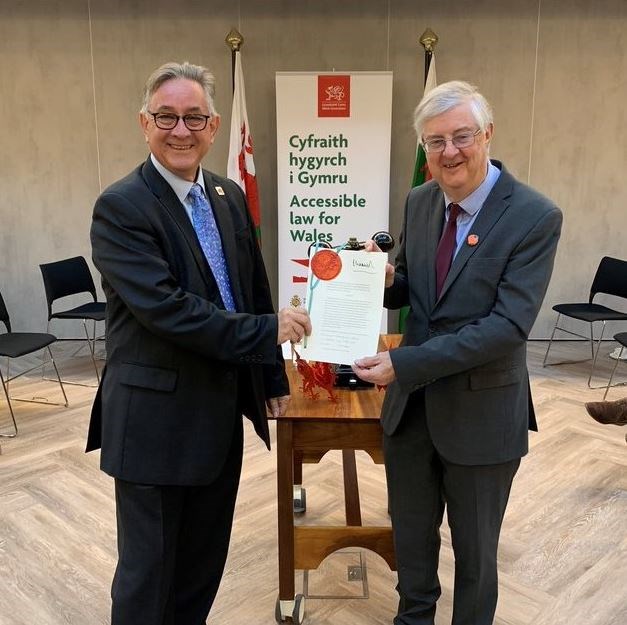
Welsh law consolidation project continues as new historic environment legislation becomes an Act
Prosiect cydgrynhoi cyfraith Cymru yn parhau wrth i ddeddfwriaeth newydd yn ymwneud â’r amgylchedd hanesyddol ddod yn Ddeddf
Welsh legislation that will better protect scheduled monuments and listed buildings has received Royal Assent.
It is the first piece of consolidated legislation to be produced as part of the Welsh Government’s programme to reform Welsh law and make it more accessible.
The Historic Environment (Wales) Act 2023 brings together the main pieces of legislation relating to Wales’ historic environment, modernising and organising the law and ensuring it is written in simple, everyday language.
For the first time the law for the historic environment will be published in a fully bilingual format.
Following the official sealing ceremony, the Welsh Government’s Counsel General Mick Antoniw spoke about the Act and how it will improve the management of our archaeological and built heritage. He also stressed his ongoing commitment to ensuring the law is straightforward and accessible.
Mick Antoniw, Counsel General and Minister for the Constitution, said:
“This Act will mean owners of scheduled monuments and listed buildings will be able to find the legislation they need all in one place, set out logically in understandable language and published bilingually. In turn, this will lead to better protection and management of the Welsh historic environment.”
Deputy Minister for Arts, Sport and Tourism, Dawn Bowden, said:
“I very much welcome this new law, which will play an important role in the effective protection and management of our unique historic environment so that it can continue to contribute to the well-being of Wales and its people.”
The Act is part of a wider Welsh Government programme to improve the accessibility of Welsh law, with work to modernise and simplify planning law through consolidation already underway.
The programme sets out a range of ambitions including: preparing a taxonomy of subjects of Welsh law, improving digital accessibility of legislation, reviewing the approach to developing bilingual legislation, and a Bill to remove obsolete provisions from Welsh law.
These ambitions were endorsed by the Senedd when it enacted the Legislation (Wales) Act 2019. Existing legislation in other areas is also being reviewed with a view to identifying further consolidation projects.
Mick Antoniw added:
“This is a significant step in our journey to ensure the law is available and understandable to more people. Our programme will help more people understand their legal rights and obligations, a vital part of a healthy democracy.”
Notes to editors
Notes
Legislation relating to the historic environment had become increasingly convoluted from a Wales perspective. Repeated amendments to legislation had left owners of scheduled monuments or listed buildings facing statutes that were difficult to navigate and language which was sometimes outdated and occasionally almost incomprehensible. Provisions were for the most part only available in English - coming from Westminster’s Statute Book - and therefore not fit for a bilingual country and government.
The future of Welsh law: A programme for 2021 to 2026 [HTML] | GOV.WALES
The Historic Environment (Wales) Act 2023 consolidates relevant provisions from the Historic Buildings and Ancient Monuments Act 1953; the Ancient Monuments and Archaeological Areas Act 1979; the Planning (Listed Buildings and Conservation Areas) Act 1990; and the Historic Environment (Wales) Act 2016.
Supporting regulations will need to be made and guidance updated before the Historic Environment (Wales) Act 2023 can be brought into force during 2024.
